ACL's Impact on Land Developers: Misrepresentation and Contract Terms
VerifiedAdded on 2020/03/02
|10
|3270
|94
Report
AI Summary
This report provides a comprehensive analysis of the Australian Consumer Law (ACL) and its implications for land developers. The report delves into the core aspects of ACL, emphasizing the significance of fair trading and consumer protection. It examines the impact of ACL on developers concerning misrepresentation, as defined by Section 18 and Section 30 of the ACL, highlighting the potential legal consequences, including civil proceedings and financial penalties, for misleading or deceptive conduct. Furthermore, the report explores the concept of unfair contract terms under Schedule 2 of the ACL, particularly in the context of consumer contracts, and how these regulations affect developers' contracts, especially in off-the-plan sales. The report also discusses relevant case law, such as Pryor v Given, to illustrate the court's approach to misrepresentation. It also clarifies the definition of a consumer contract and the importance of understanding the purchaser's intentions. The report concludes by summarizing the key impacts of the ACL on land developers and the importance of compliance.
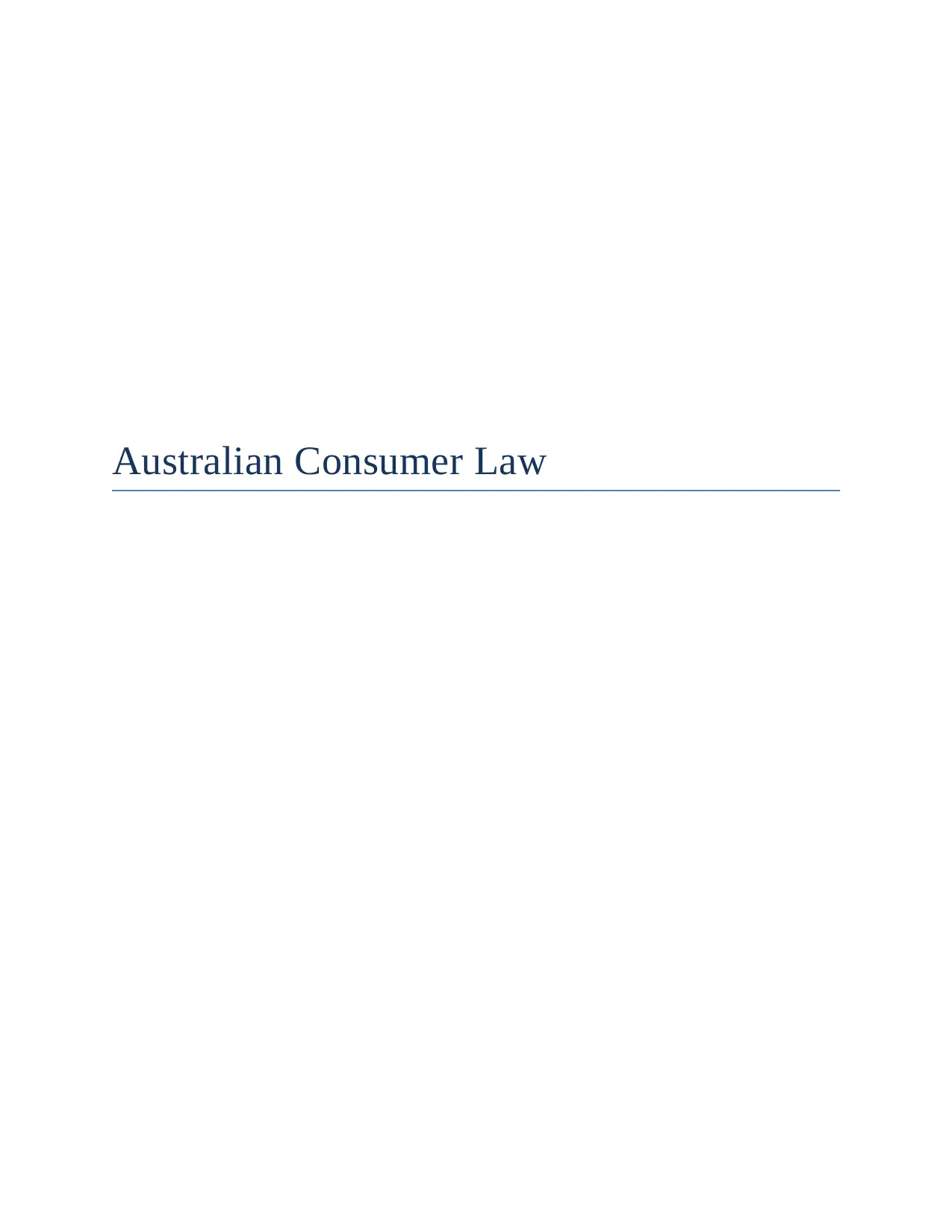
Australian Consumer Law
Paraphrase This Document
Need a fresh take? Get an instant paraphrase of this document with our AI Paraphraser
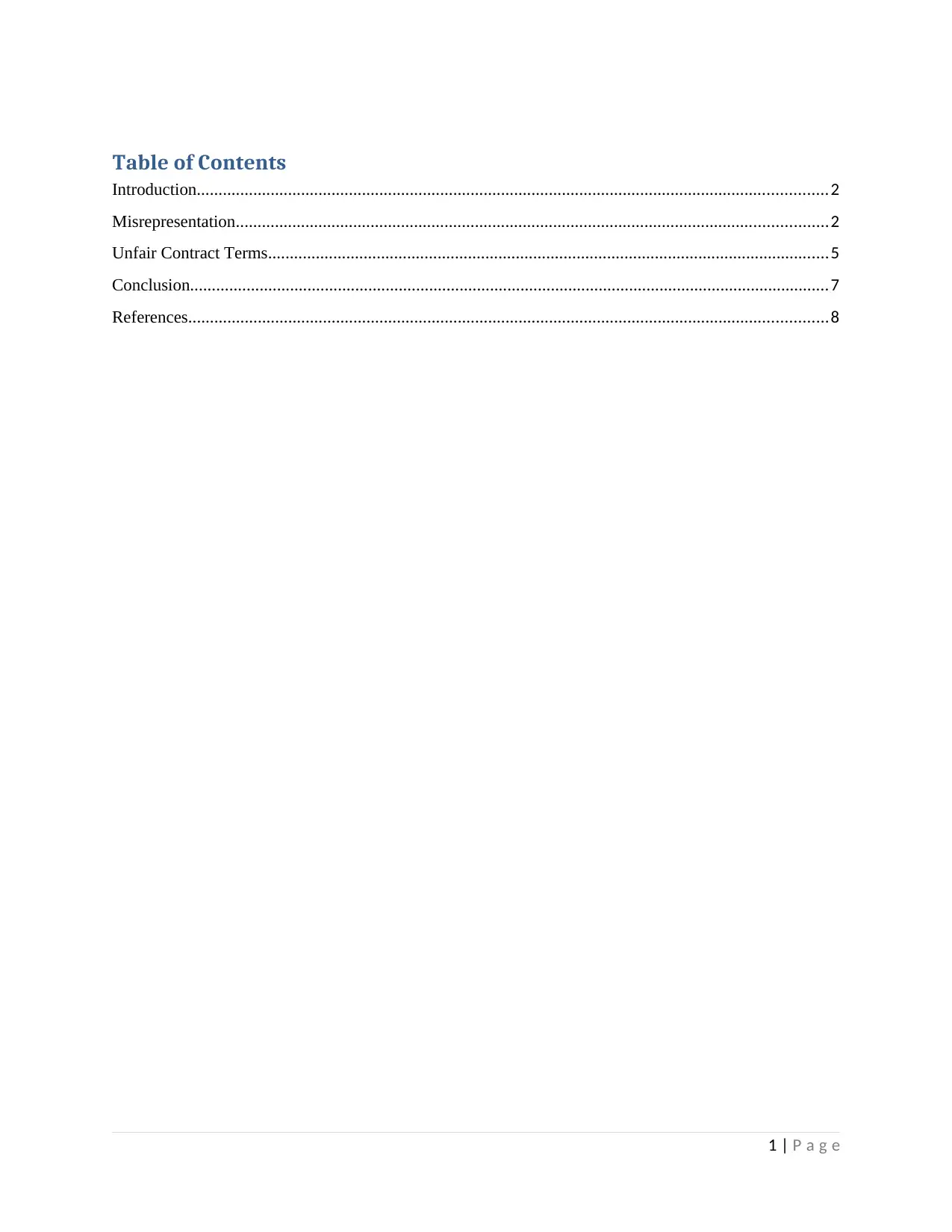
Table of Contents
Introduction.................................................................................................................................................2
Misrepresentation........................................................................................................................................2
Unfair Contract Terms.................................................................................................................................5
Conclusion...................................................................................................................................................7
References...................................................................................................................................................8
1 | P a g e
Introduction.................................................................................................................................................2
Misrepresentation........................................................................................................................................2
Unfair Contract Terms.................................................................................................................................5
Conclusion...................................................................................................................................................7
References...................................................................................................................................................8
1 | P a g e
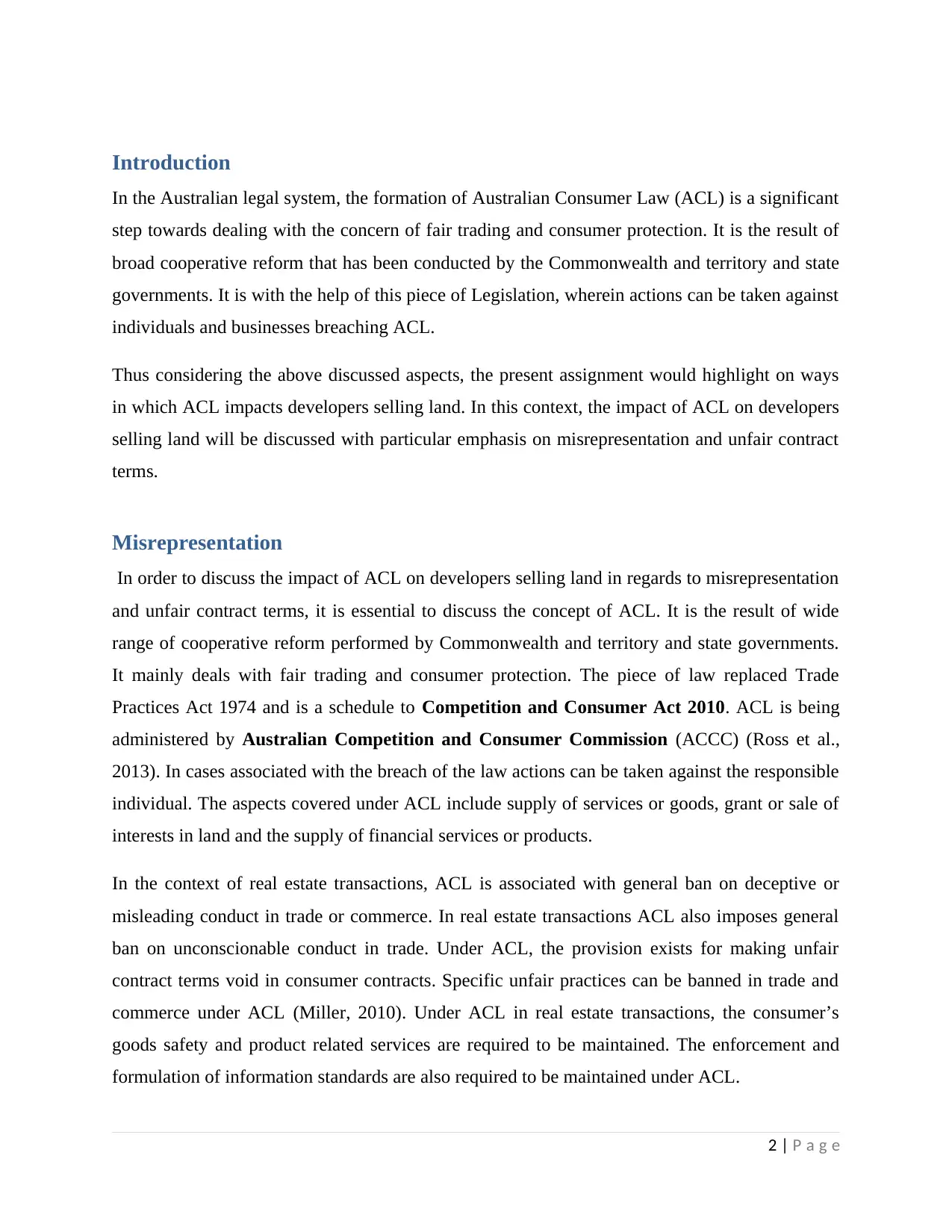
Introduction
In the Australian legal system, the formation of Australian Consumer Law (ACL) is a significant
step towards dealing with the concern of fair trading and consumer protection. It is the result of
broad cooperative reform that has been conducted by the Commonwealth and territory and state
governments. It is with the help of this piece of Legislation, wherein actions can be taken against
individuals and businesses breaching ACL.
Thus considering the above discussed aspects, the present assignment would highlight on ways
in which ACL impacts developers selling land. In this context, the impact of ACL on developers
selling land will be discussed with particular emphasis on misrepresentation and unfair contract
terms.
Misrepresentation
In order to discuss the impact of ACL on developers selling land in regards to misrepresentation
and unfair contract terms, it is essential to discuss the concept of ACL. It is the result of wide
range of cooperative reform performed by Commonwealth and territory and state governments.
It mainly deals with fair trading and consumer protection. The piece of law replaced Trade
Practices Act 1974 and is a schedule to Competition and Consumer Act 2010. ACL is being
administered by Australian Competition and Consumer Commission (ACCC) (Ross et al.,
2013). In cases associated with the breach of the law actions can be taken against the responsible
individual. The aspects covered under ACL include supply of services or goods, grant or sale of
interests in land and the supply of financial services or products.
In the context of real estate transactions, ACL is associated with general ban on deceptive or
misleading conduct in trade or commerce. In real estate transactions ACL also imposes general
ban on unconscionable conduct in trade. Under ACL, the provision exists for making unfair
contract terms void in consumer contracts. Specific unfair practices can be banned in trade and
commerce under ACL (Miller, 2010). Under ACL in real estate transactions, the consumer’s
goods safety and product related services are required to be maintained. The enforcement and
formulation of information standards are also required to be maintained under ACL.
2 | P a g e
In the Australian legal system, the formation of Australian Consumer Law (ACL) is a significant
step towards dealing with the concern of fair trading and consumer protection. It is the result of
broad cooperative reform that has been conducted by the Commonwealth and territory and state
governments. It is with the help of this piece of Legislation, wherein actions can be taken against
individuals and businesses breaching ACL.
Thus considering the above discussed aspects, the present assignment would highlight on ways
in which ACL impacts developers selling land. In this context, the impact of ACL on developers
selling land will be discussed with particular emphasis on misrepresentation and unfair contract
terms.
Misrepresentation
In order to discuss the impact of ACL on developers selling land in regards to misrepresentation
and unfair contract terms, it is essential to discuss the concept of ACL. It is the result of wide
range of cooperative reform performed by Commonwealth and territory and state governments.
It mainly deals with fair trading and consumer protection. The piece of law replaced Trade
Practices Act 1974 and is a schedule to Competition and Consumer Act 2010. ACL is being
administered by Australian Competition and Consumer Commission (ACCC) (Ross et al.,
2013). In cases associated with the breach of the law actions can be taken against the responsible
individual. The aspects covered under ACL include supply of services or goods, grant or sale of
interests in land and the supply of financial services or products.
In the context of real estate transactions, ACL is associated with general ban on deceptive or
misleading conduct in trade or commerce. In real estate transactions ACL also imposes general
ban on unconscionable conduct in trade. Under ACL, the provision exists for making unfair
contract terms void in consumer contracts. Specific unfair practices can be banned in trade and
commerce under ACL (Miller, 2010). Under ACL in real estate transactions, the consumer’s
goods safety and product related services are required to be maintained. The enforcement and
formulation of information standards are also required to be maintained under ACL.
2 | P a g e
⊘ This is a preview!⊘
Do you want full access?
Subscribe today to unlock all pages.

Trusted by 1+ million students worldwide
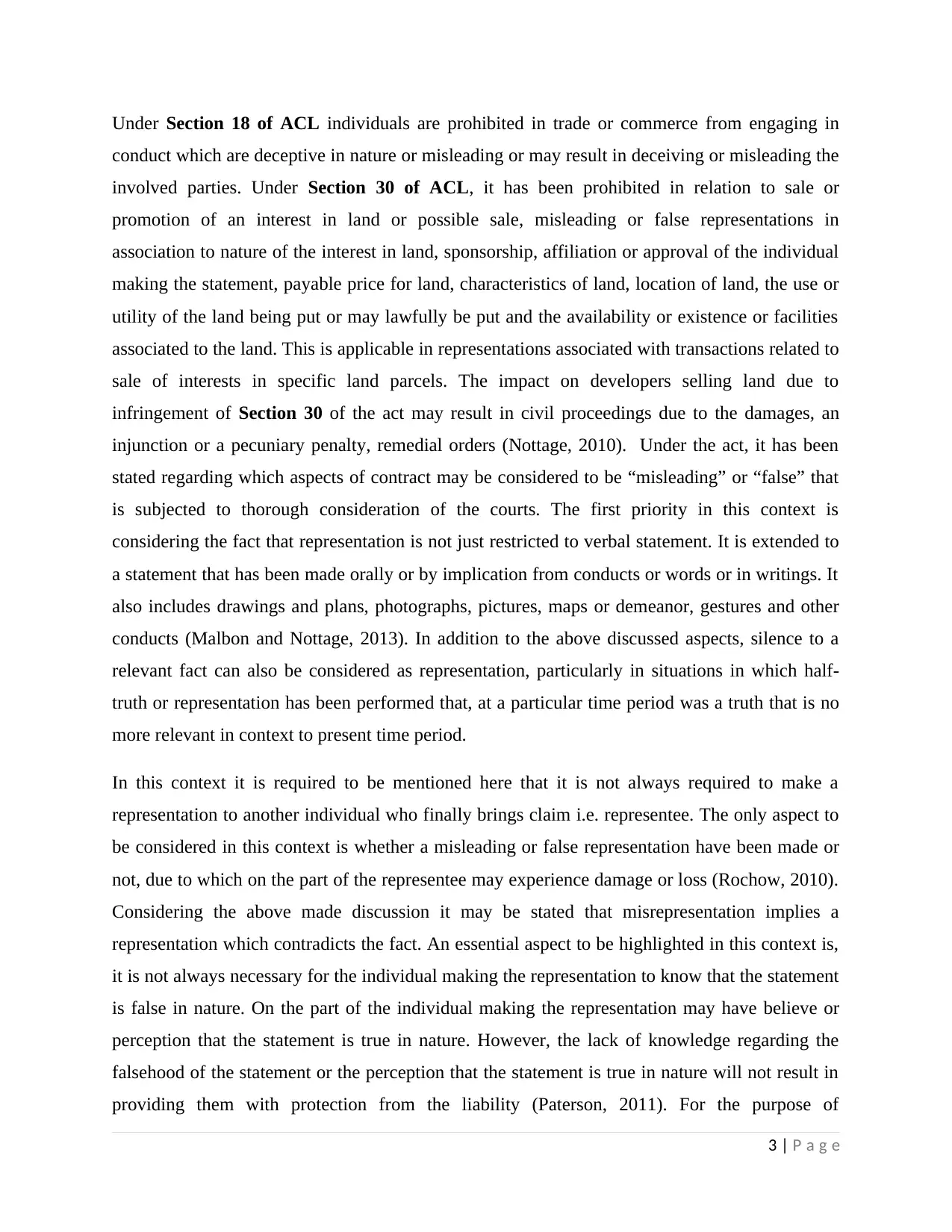
Under Section 18 of ACL individuals are prohibited in trade or commerce from engaging in
conduct which are deceptive in nature or misleading or may result in deceiving or misleading the
involved parties. Under Section 30 of ACL, it has been prohibited in relation to sale or
promotion of an interest in land or possible sale, misleading or false representations in
association to nature of the interest in land, sponsorship, affiliation or approval of the individual
making the statement, payable price for land, characteristics of land, location of land, the use or
utility of the land being put or may lawfully be put and the availability or existence or facilities
associated to the land. This is applicable in representations associated with transactions related to
sale of interests in specific land parcels. The impact on developers selling land due to
infringement of Section 30 of the act may result in civil proceedings due to the damages, an
injunction or a pecuniary penalty, remedial orders (Nottage, 2010). Under the act, it has been
stated regarding which aspects of contract may be considered to be “misleading” or “false” that
is subjected to thorough consideration of the courts. The first priority in this context is
considering the fact that representation is not just restricted to verbal statement. It is extended to
a statement that has been made orally or by implication from conducts or words or in writings. It
also includes drawings and plans, photographs, pictures, maps or demeanor, gestures and other
conducts (Malbon and Nottage, 2013). In addition to the above discussed aspects, silence to a
relevant fact can also be considered as representation, particularly in situations in which half-
truth or representation has been performed that, at a particular time period was a truth that is no
more relevant in context to present time period.
In this context it is required to be mentioned here that it is not always required to make a
representation to another individual who finally brings claim i.e. representee. The only aspect to
be considered in this context is whether a misleading or false representation have been made or
not, due to which on the part of the representee may experience damage or loss (Rochow, 2010).
Considering the above made discussion it may be stated that misrepresentation implies a
representation which contradicts the fact. An essential aspect to be highlighted in this context is,
it is not always necessary for the individual making the representation to know that the statement
is false in nature. On the part of the individual making the representation may have believe or
perception that the statement is true in nature. However, the lack of knowledge regarding the
falsehood of the statement or the perception that the statement is true in nature will not result in
providing them with protection from the liability (Paterson, 2011). For the purpose of
3 | P a g e
conduct which are deceptive in nature or misleading or may result in deceiving or misleading the
involved parties. Under Section 30 of ACL, it has been prohibited in relation to sale or
promotion of an interest in land or possible sale, misleading or false representations in
association to nature of the interest in land, sponsorship, affiliation or approval of the individual
making the statement, payable price for land, characteristics of land, location of land, the use or
utility of the land being put or may lawfully be put and the availability or existence or facilities
associated to the land. This is applicable in representations associated with transactions related to
sale of interests in specific land parcels. The impact on developers selling land due to
infringement of Section 30 of the act may result in civil proceedings due to the damages, an
injunction or a pecuniary penalty, remedial orders (Nottage, 2010). Under the act, it has been
stated regarding which aspects of contract may be considered to be “misleading” or “false” that
is subjected to thorough consideration of the courts. The first priority in this context is
considering the fact that representation is not just restricted to verbal statement. It is extended to
a statement that has been made orally or by implication from conducts or words or in writings. It
also includes drawings and plans, photographs, pictures, maps or demeanor, gestures and other
conducts (Malbon and Nottage, 2013). In addition to the above discussed aspects, silence to a
relevant fact can also be considered as representation, particularly in situations in which half-
truth or representation has been performed that, at a particular time period was a truth that is no
more relevant in context to present time period.
In this context it is required to be mentioned here that it is not always required to make a
representation to another individual who finally brings claim i.e. representee. The only aspect to
be considered in this context is whether a misleading or false representation have been made or
not, due to which on the part of the representee may experience damage or loss (Rochow, 2010).
Considering the above made discussion it may be stated that misrepresentation implies a
representation which contradicts the fact. An essential aspect to be highlighted in this context is,
it is not always necessary for the individual making the representation to know that the statement
is false in nature. On the part of the individual making the representation may have believe or
perception that the statement is true in nature. However, the lack of knowledge regarding the
falsehood of the statement or the perception that the statement is true in nature will not result in
providing them with protection from the liability (Paterson, 2011). For the purpose of
3 | P a g e
Paraphrase This Document
Need a fresh take? Get an instant paraphrase of this document with our AI Paraphraser
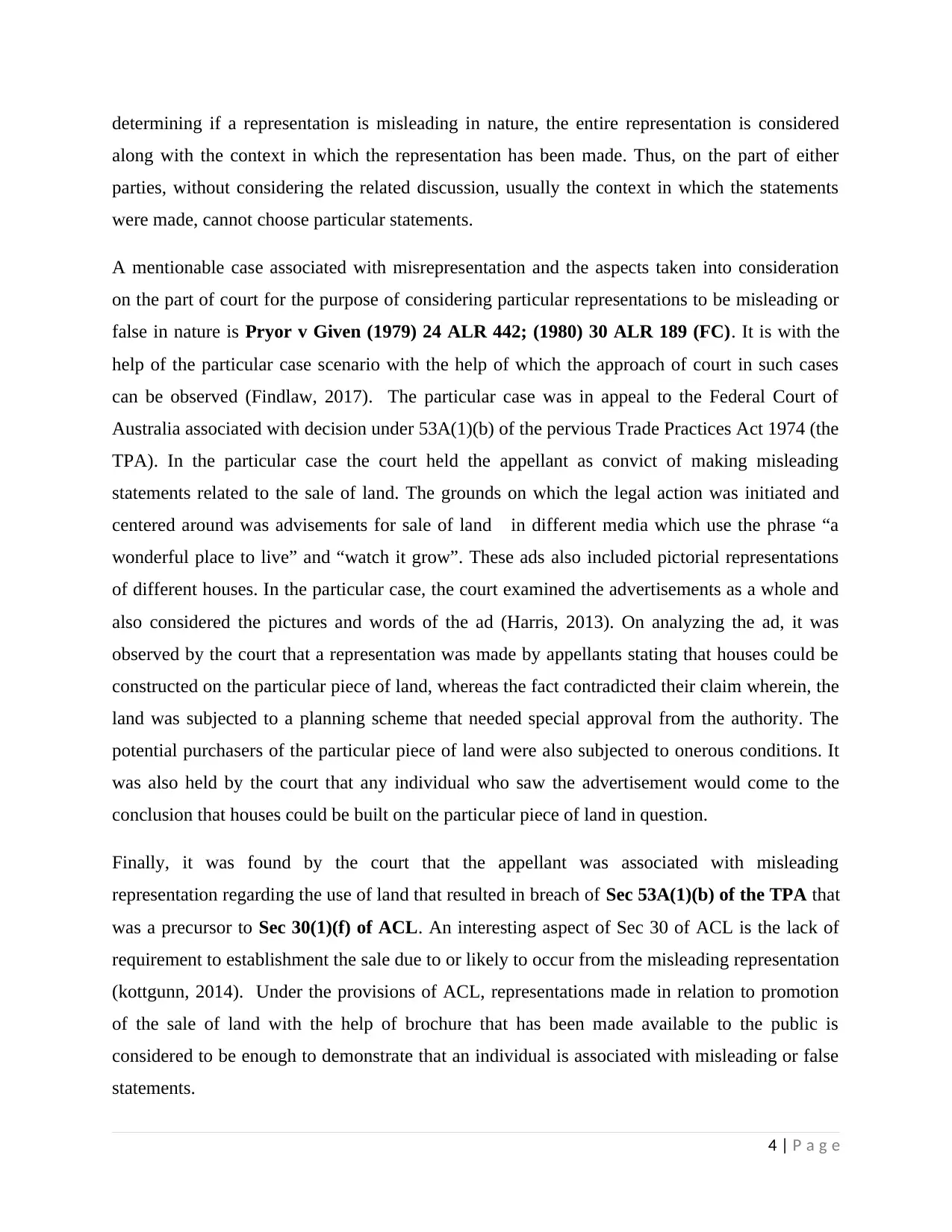
determining if a representation is misleading in nature, the entire representation is considered
along with the context in which the representation has been made. Thus, on the part of either
parties, without considering the related discussion, usually the context in which the statements
were made, cannot choose particular statements.
A mentionable case associated with misrepresentation and the aspects taken into consideration
on the part of court for the purpose of considering particular representations to be misleading or
false in nature is Pryor v Given (1979) 24 ALR 442; (1980) 30 ALR 189 (FC). It is with the
help of the particular case scenario with the help of which the approach of court in such cases
can be observed (Findlaw, 2017). The particular case was in appeal to the Federal Court of
Australia associated with decision under 53A(1)(b) of the pervious Trade Practices Act 1974 (the
TPA). In the particular case the court held the appellant as convict of making misleading
statements related to the sale of land. The grounds on which the legal action was initiated and
centered around was advisements for sale of land in different media which use the phrase “a
wonderful place to live” and “watch it grow”. These ads also included pictorial representations
of different houses. In the particular case, the court examined the advertisements as a whole and
also considered the pictures and words of the ad (Harris, 2013). On analyzing the ad, it was
observed by the court that a representation was made by appellants stating that houses could be
constructed on the particular piece of land, whereas the fact contradicted their claim wherein, the
land was subjected to a planning scheme that needed special approval from the authority. The
potential purchasers of the particular piece of land were also subjected to onerous conditions. It
was also held by the court that any individual who saw the advertisement would come to the
conclusion that houses could be built on the particular piece of land in question.
Finally, it was found by the court that the appellant was associated with misleading
representation regarding the use of land that resulted in breach of Sec 53A(1)(b) of the TPA that
was a precursor to Sec 30(1)(f) of ACL. An interesting aspect of Sec 30 of ACL is the lack of
requirement to establishment the sale due to or likely to occur from the misleading representation
(kottgunn, 2014). Under the provisions of ACL, representations made in relation to promotion
of the sale of land with the help of brochure that has been made available to the public is
considered to be enough to demonstrate that an individual is associated with misleading or false
statements.
4 | P a g e
along with the context in which the representation has been made. Thus, on the part of either
parties, without considering the related discussion, usually the context in which the statements
were made, cannot choose particular statements.
A mentionable case associated with misrepresentation and the aspects taken into consideration
on the part of court for the purpose of considering particular representations to be misleading or
false in nature is Pryor v Given (1979) 24 ALR 442; (1980) 30 ALR 189 (FC). It is with the
help of the particular case scenario with the help of which the approach of court in such cases
can be observed (Findlaw, 2017). The particular case was in appeal to the Federal Court of
Australia associated with decision under 53A(1)(b) of the pervious Trade Practices Act 1974 (the
TPA). In the particular case the court held the appellant as convict of making misleading
statements related to the sale of land. The grounds on which the legal action was initiated and
centered around was advisements for sale of land in different media which use the phrase “a
wonderful place to live” and “watch it grow”. These ads also included pictorial representations
of different houses. In the particular case, the court examined the advertisements as a whole and
also considered the pictures and words of the ad (Harris, 2013). On analyzing the ad, it was
observed by the court that a representation was made by appellants stating that houses could be
constructed on the particular piece of land, whereas the fact contradicted their claim wherein, the
land was subjected to a planning scheme that needed special approval from the authority. The
potential purchasers of the particular piece of land were also subjected to onerous conditions. It
was also held by the court that any individual who saw the advertisement would come to the
conclusion that houses could be built on the particular piece of land in question.
Finally, it was found by the court that the appellant was associated with misleading
representation regarding the use of land that resulted in breach of Sec 53A(1)(b) of the TPA that
was a precursor to Sec 30(1)(f) of ACL. An interesting aspect of Sec 30 of ACL is the lack of
requirement to establishment the sale due to or likely to occur from the misleading representation
(kottgunn, 2014). Under the provisions of ACL, representations made in relation to promotion
of the sale of land with the help of brochure that has been made available to the public is
considered to be enough to demonstrate that an individual is associated with misleading or false
statements.
4 | P a g e
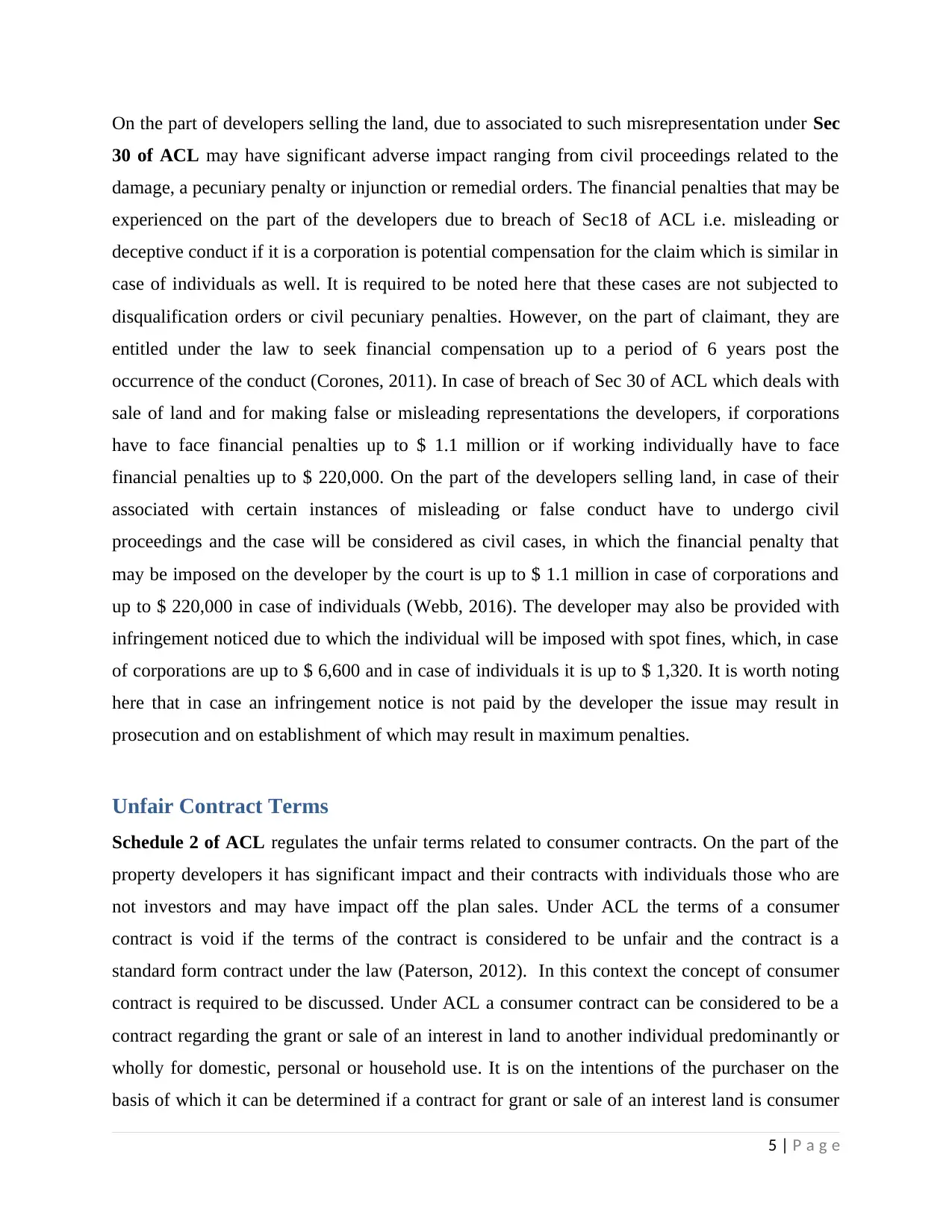
On the part of developers selling the land, due to associated to such misrepresentation under Sec
30 of ACL may have significant adverse impact ranging from civil proceedings related to the
damage, a pecuniary penalty or injunction or remedial orders. The financial penalties that may be
experienced on the part of the developers due to breach of Sec18 of ACL i.e. misleading or
deceptive conduct if it is a corporation is potential compensation for the claim which is similar in
case of individuals as well. It is required to be noted here that these cases are not subjected to
disqualification orders or civil pecuniary penalties. However, on the part of claimant, they are
entitled under the law to seek financial compensation up to a period of 6 years post the
occurrence of the conduct (Corones, 2011). In case of breach of Sec 30 of ACL which deals with
sale of land and for making false or misleading representations the developers, if corporations
have to face financial penalties up to $ 1.1 million or if working individually have to face
financial penalties up to $ 220,000. On the part of the developers selling land, in case of their
associated with certain instances of misleading or false conduct have to undergo civil
proceedings and the case will be considered as civil cases, in which the financial penalty that
may be imposed on the developer by the court is up to $ 1.1 million in case of corporations and
up to $ 220,000 in case of individuals (Webb, 2016). The developer may also be provided with
infringement noticed due to which the individual will be imposed with spot fines, which, in case
of corporations are up to $ 6,600 and in case of individuals it is up to $ 1,320. It is worth noting
here that in case an infringement notice is not paid by the developer the issue may result in
prosecution and on establishment of which may result in maximum penalties.
Unfair Contract Terms
Schedule 2 of ACL regulates the unfair terms related to consumer contracts. On the part of the
property developers it has significant impact and their contracts with individuals those who are
not investors and may have impact off the plan sales. Under ACL the terms of a consumer
contract is void if the terms of the contract is considered to be unfair and the contract is a
standard form contract under the law (Paterson, 2012). In this context the concept of consumer
contract is required to be discussed. Under ACL a consumer contract can be considered to be a
contract regarding the grant or sale of an interest in land to another individual predominantly or
wholly for domestic, personal or household use. It is on the intentions of the purchaser on the
basis of which it can be determined if a contract for grant or sale of an interest land is consumer
5 | P a g e
30 of ACL may have significant adverse impact ranging from civil proceedings related to the
damage, a pecuniary penalty or injunction or remedial orders. The financial penalties that may be
experienced on the part of the developers due to breach of Sec18 of ACL i.e. misleading or
deceptive conduct if it is a corporation is potential compensation for the claim which is similar in
case of individuals as well. It is required to be noted here that these cases are not subjected to
disqualification orders or civil pecuniary penalties. However, on the part of claimant, they are
entitled under the law to seek financial compensation up to a period of 6 years post the
occurrence of the conduct (Corones, 2011). In case of breach of Sec 30 of ACL which deals with
sale of land and for making false or misleading representations the developers, if corporations
have to face financial penalties up to $ 1.1 million or if working individually have to face
financial penalties up to $ 220,000. On the part of the developers selling land, in case of their
associated with certain instances of misleading or false conduct have to undergo civil
proceedings and the case will be considered as civil cases, in which the financial penalty that
may be imposed on the developer by the court is up to $ 1.1 million in case of corporations and
up to $ 220,000 in case of individuals (Webb, 2016). The developer may also be provided with
infringement noticed due to which the individual will be imposed with spot fines, which, in case
of corporations are up to $ 6,600 and in case of individuals it is up to $ 1,320. It is worth noting
here that in case an infringement notice is not paid by the developer the issue may result in
prosecution and on establishment of which may result in maximum penalties.
Unfair Contract Terms
Schedule 2 of ACL regulates the unfair terms related to consumer contracts. On the part of the
property developers it has significant impact and their contracts with individuals those who are
not investors and may have impact off the plan sales. Under ACL the terms of a consumer
contract is void if the terms of the contract is considered to be unfair and the contract is a
standard form contract under the law (Paterson, 2012). In this context the concept of consumer
contract is required to be discussed. Under ACL a consumer contract can be considered to be a
contract regarding the grant or sale of an interest in land to another individual predominantly or
wholly for domestic, personal or household use. It is on the intentions of the purchaser on the
basis of which it can be determined if a contract for grant or sale of an interest land is consumer
5 | P a g e
⊘ This is a preview!⊘
Do you want full access?
Subscribe today to unlock all pages.

Trusted by 1+ million students worldwide
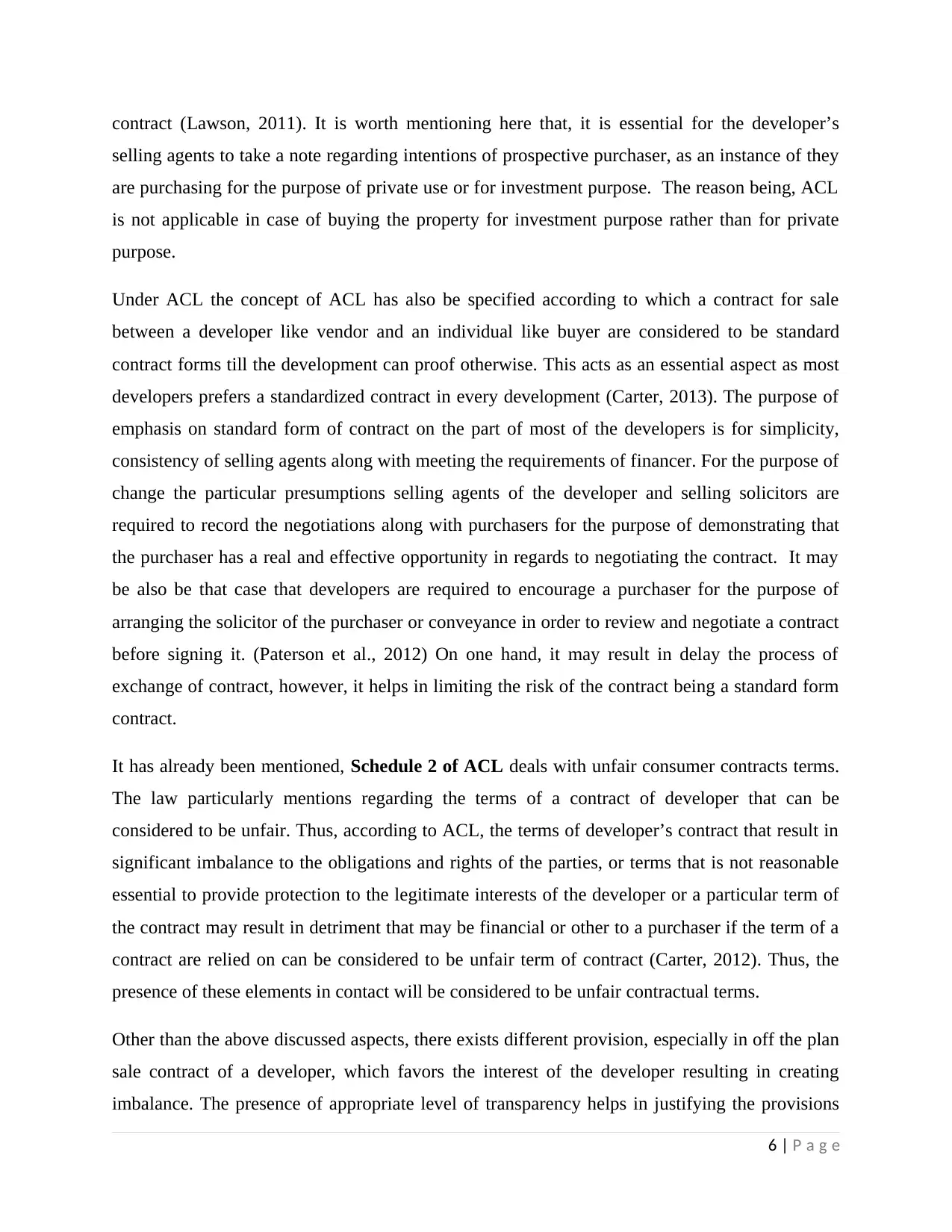
contract (Lawson, 2011). It is worth mentioning here that, it is essential for the developer’s
selling agents to take a note regarding intentions of prospective purchaser, as an instance of they
are purchasing for the purpose of private use or for investment purpose. The reason being, ACL
is not applicable in case of buying the property for investment purpose rather than for private
purpose.
Under ACL the concept of ACL has also be specified according to which a contract for sale
between a developer like vendor and an individual like buyer are considered to be standard
contract forms till the development can proof otherwise. This acts as an essential aspect as most
developers prefers a standardized contract in every development (Carter, 2013). The purpose of
emphasis on standard form of contract on the part of most of the developers is for simplicity,
consistency of selling agents along with meeting the requirements of financer. For the purpose of
change the particular presumptions selling agents of the developer and selling solicitors are
required to record the negotiations along with purchasers for the purpose of demonstrating that
the purchaser has a real and effective opportunity in regards to negotiating the contract. It may
be also be that case that developers are required to encourage a purchaser for the purpose of
arranging the solicitor of the purchaser or conveyance in order to review and negotiate a contract
before signing it. (Paterson et al., 2012) On one hand, it may result in delay the process of
exchange of contract, however, it helps in limiting the risk of the contract being a standard form
contract.
It has already been mentioned, Schedule 2 of ACL deals with unfair consumer contracts terms.
The law particularly mentions regarding the terms of a contract of developer that can be
considered to be unfair. Thus, according to ACL, the terms of developer’s contract that result in
significant imbalance to the obligations and rights of the parties, or terms that is not reasonable
essential to provide protection to the legitimate interests of the developer or a particular term of
the contract may result in detriment that may be financial or other to a purchaser if the term of a
contract are relied on can be considered to be unfair term of contract (Carter, 2012). Thus, the
presence of these elements in contact will be considered to be unfair contractual terms.
Other than the above discussed aspects, there exists different provision, especially in off the plan
sale contract of a developer, which favors the interest of the developer resulting in creating
imbalance. The presence of appropriate level of transparency helps in justifying the provisions
6 | P a g e
selling agents to take a note regarding intentions of prospective purchaser, as an instance of they
are purchasing for the purpose of private use or for investment purpose. The reason being, ACL
is not applicable in case of buying the property for investment purpose rather than for private
purpose.
Under ACL the concept of ACL has also be specified according to which a contract for sale
between a developer like vendor and an individual like buyer are considered to be standard
contract forms till the development can proof otherwise. This acts as an essential aspect as most
developers prefers a standardized contract in every development (Carter, 2013). The purpose of
emphasis on standard form of contract on the part of most of the developers is for simplicity,
consistency of selling agents along with meeting the requirements of financer. For the purpose of
change the particular presumptions selling agents of the developer and selling solicitors are
required to record the negotiations along with purchasers for the purpose of demonstrating that
the purchaser has a real and effective opportunity in regards to negotiating the contract. It may
be also be that case that developers are required to encourage a purchaser for the purpose of
arranging the solicitor of the purchaser or conveyance in order to review and negotiate a contract
before signing it. (Paterson et al., 2012) On one hand, it may result in delay the process of
exchange of contract, however, it helps in limiting the risk of the contract being a standard form
contract.
It has already been mentioned, Schedule 2 of ACL deals with unfair consumer contracts terms.
The law particularly mentions regarding the terms of a contract of developer that can be
considered to be unfair. Thus, according to ACL, the terms of developer’s contract that result in
significant imbalance to the obligations and rights of the parties, or terms that is not reasonable
essential to provide protection to the legitimate interests of the developer or a particular term of
the contract may result in detriment that may be financial or other to a purchaser if the term of a
contract are relied on can be considered to be unfair term of contract (Carter, 2012). Thus, the
presence of these elements in contact will be considered to be unfair contractual terms.
Other than the above discussed aspects, there exists different provision, especially in off the plan
sale contract of a developer, which favors the interest of the developer resulting in creating
imbalance. The presence of appropriate level of transparency helps in justifying the provisions
6 | P a g e
Paraphrase This Document
Need a fresh take? Get an instant paraphrase of this document with our AI Paraphraser
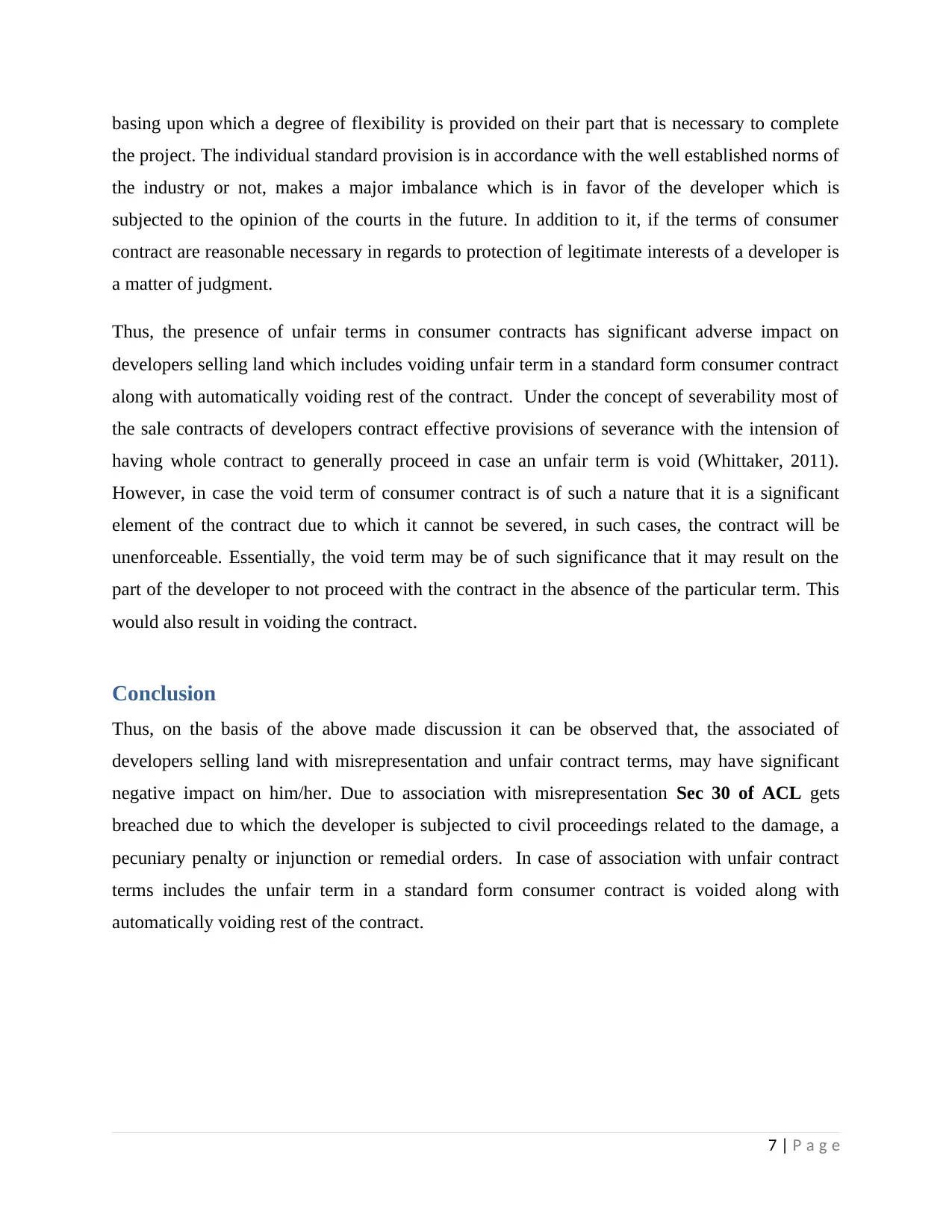
basing upon which a degree of flexibility is provided on their part that is necessary to complete
the project. The individual standard provision is in accordance with the well established norms of
the industry or not, makes a major imbalance which is in favor of the developer which is
subjected to the opinion of the courts in the future. In addition to it, if the terms of consumer
contract are reasonable necessary in regards to protection of legitimate interests of a developer is
a matter of judgment.
Thus, the presence of unfair terms in consumer contracts has significant adverse impact on
developers selling land which includes voiding unfair term in a standard form consumer contract
along with automatically voiding rest of the contract. Under the concept of severability most of
the sale contracts of developers contract effective provisions of severance with the intension of
having whole contract to generally proceed in case an unfair term is void (Whittaker, 2011).
However, in case the void term of consumer contract is of such a nature that it is a significant
element of the contract due to which it cannot be severed, in such cases, the contract will be
unenforceable. Essentially, the void term may be of such significance that it may result on the
part of the developer to not proceed with the contract in the absence of the particular term. This
would also result in voiding the contract.
Conclusion
Thus, on the basis of the above made discussion it can be observed that, the associated of
developers selling land with misrepresentation and unfair contract terms, may have significant
negative impact on him/her. Due to association with misrepresentation Sec 30 of ACL gets
breached due to which the developer is subjected to civil proceedings related to the damage, a
pecuniary penalty or injunction or remedial orders. In case of association with unfair contract
terms includes the unfair term in a standard form consumer contract is voided along with
automatically voiding rest of the contract.
7 | P a g e
the project. The individual standard provision is in accordance with the well established norms of
the industry or not, makes a major imbalance which is in favor of the developer which is
subjected to the opinion of the courts in the future. In addition to it, if the terms of consumer
contract are reasonable necessary in regards to protection of legitimate interests of a developer is
a matter of judgment.
Thus, the presence of unfair terms in consumer contracts has significant adverse impact on
developers selling land which includes voiding unfair term in a standard form consumer contract
along with automatically voiding rest of the contract. Under the concept of severability most of
the sale contracts of developers contract effective provisions of severance with the intension of
having whole contract to generally proceed in case an unfair term is void (Whittaker, 2011).
However, in case the void term of consumer contract is of such a nature that it is a significant
element of the contract due to which it cannot be severed, in such cases, the contract will be
unenforceable. Essentially, the void term may be of such significance that it may result on the
part of the developer to not proceed with the contract in the absence of the particular term. This
would also result in voiding the contract.
Conclusion
Thus, on the basis of the above made discussion it can be observed that, the associated of
developers selling land with misrepresentation and unfair contract terms, may have significant
negative impact on him/her. Due to association with misrepresentation Sec 30 of ACL gets
breached due to which the developer is subjected to civil proceedings related to the damage, a
pecuniary penalty or injunction or remedial orders. In case of association with unfair contract
terms includes the unfair term in a standard form consumer contract is voided along with
automatically voiding rest of the contract.
7 | P a g e
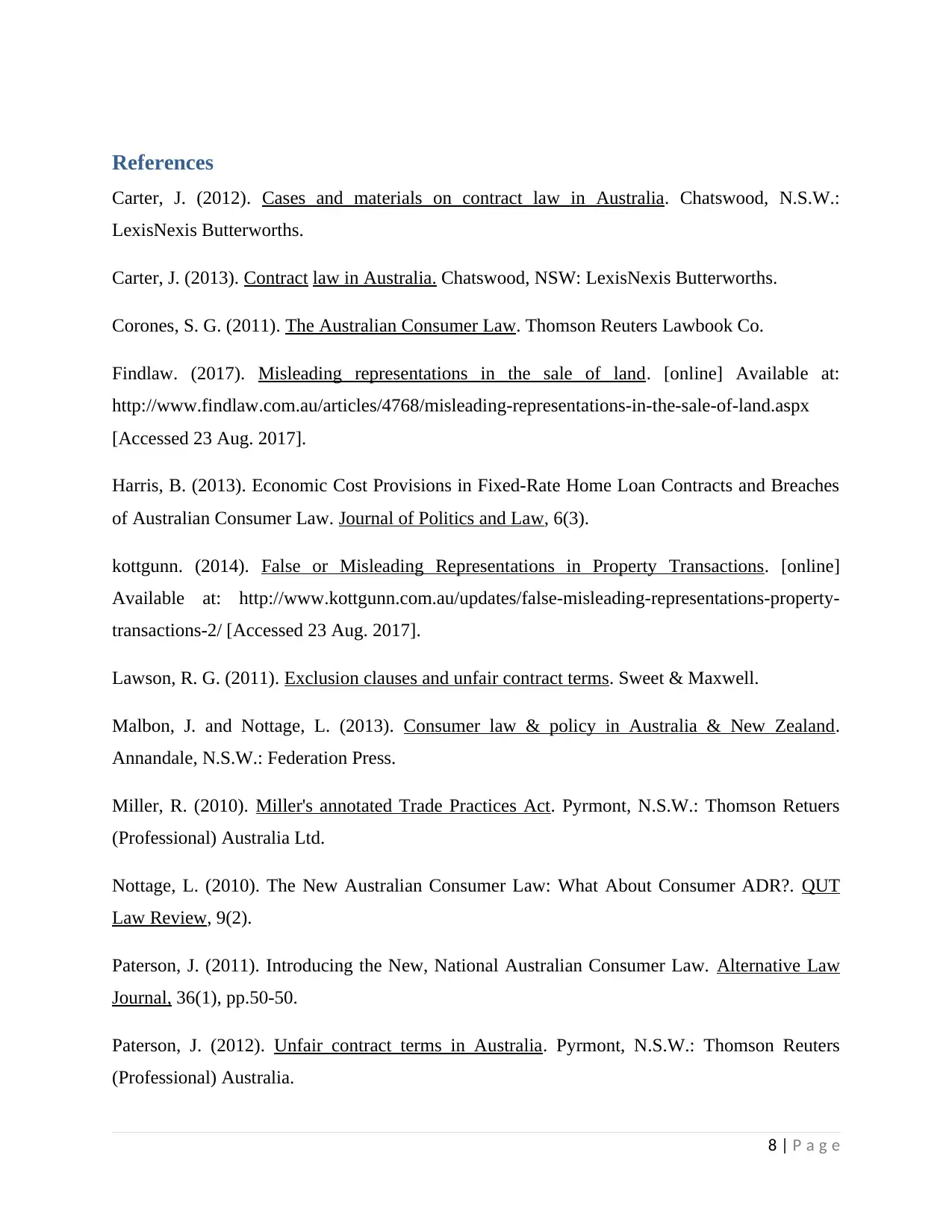
References
Carter, J. (2012). Cases and materials on contract law in Australia. Chatswood, N.S.W.:
LexisNexis Butterworths.
Carter, J. (2013). Contract law in Australia. Chatswood, NSW: LexisNexis Butterworths.
Corones, S. G. (2011). The Australian Consumer Law. Thomson Reuters Lawbook Co.
Findlaw. (2017). Misleading representations in the sale of land. [online] Available at:
http://www.findlaw.com.au/articles/4768/misleading-representations-in-the-sale-of-land.aspx
[Accessed 23 Aug. 2017].
Harris, B. (2013). Economic Cost Provisions in Fixed-Rate Home Loan Contracts and Breaches
of Australian Consumer Law. Journal of Politics and Law, 6(3).
kottgunn. (2014). False or Misleading Representations in Property Transactions. [online]
Available at: http://www.kottgunn.com.au/updates/false-misleading-representations-property-
transactions-2/ [Accessed 23 Aug. 2017].
Lawson, R. G. (2011). Exclusion clauses and unfair contract terms. Sweet & Maxwell.
Malbon, J. and Nottage, L. (2013). Consumer law & policy in Australia & New Zealand.
Annandale, N.S.W.: Federation Press.
Miller, R. (2010). Miller's annotated Trade Practices Act. Pyrmont, N.S.W.: Thomson Retuers
(Professional) Australia Ltd.
Nottage, L. (2010). The New Australian Consumer Law: What About Consumer ADR?. QUT
Law Review, 9(2).
Paterson, J. (2011). Introducing the New, National Australian Consumer Law. Alternative Law
Journal, 36(1), pp.50-50.
Paterson, J. (2012). Unfair contract terms in Australia. Pyrmont, N.S.W.: Thomson Reuters
(Professional) Australia.
8 | P a g e
Carter, J. (2012). Cases and materials on contract law in Australia. Chatswood, N.S.W.:
LexisNexis Butterworths.
Carter, J. (2013). Contract law in Australia. Chatswood, NSW: LexisNexis Butterworths.
Corones, S. G. (2011). The Australian Consumer Law. Thomson Reuters Lawbook Co.
Findlaw. (2017). Misleading representations in the sale of land. [online] Available at:
http://www.findlaw.com.au/articles/4768/misleading-representations-in-the-sale-of-land.aspx
[Accessed 23 Aug. 2017].
Harris, B. (2013). Economic Cost Provisions in Fixed-Rate Home Loan Contracts and Breaches
of Australian Consumer Law. Journal of Politics and Law, 6(3).
kottgunn. (2014). False or Misleading Representations in Property Transactions. [online]
Available at: http://www.kottgunn.com.au/updates/false-misleading-representations-property-
transactions-2/ [Accessed 23 Aug. 2017].
Lawson, R. G. (2011). Exclusion clauses and unfair contract terms. Sweet & Maxwell.
Malbon, J. and Nottage, L. (2013). Consumer law & policy in Australia & New Zealand.
Annandale, N.S.W.: Federation Press.
Miller, R. (2010). Miller's annotated Trade Practices Act. Pyrmont, N.S.W.: Thomson Retuers
(Professional) Australia Ltd.
Nottage, L. (2010). The New Australian Consumer Law: What About Consumer ADR?. QUT
Law Review, 9(2).
Paterson, J. (2011). Introducing the New, National Australian Consumer Law. Alternative Law
Journal, 36(1), pp.50-50.
Paterson, J. (2012). Unfair contract terms in Australia. Pyrmont, N.S.W.: Thomson Reuters
(Professional) Australia.
8 | P a g e
⊘ This is a preview!⊘
Do you want full access?
Subscribe today to unlock all pages.

Trusted by 1+ million students worldwide
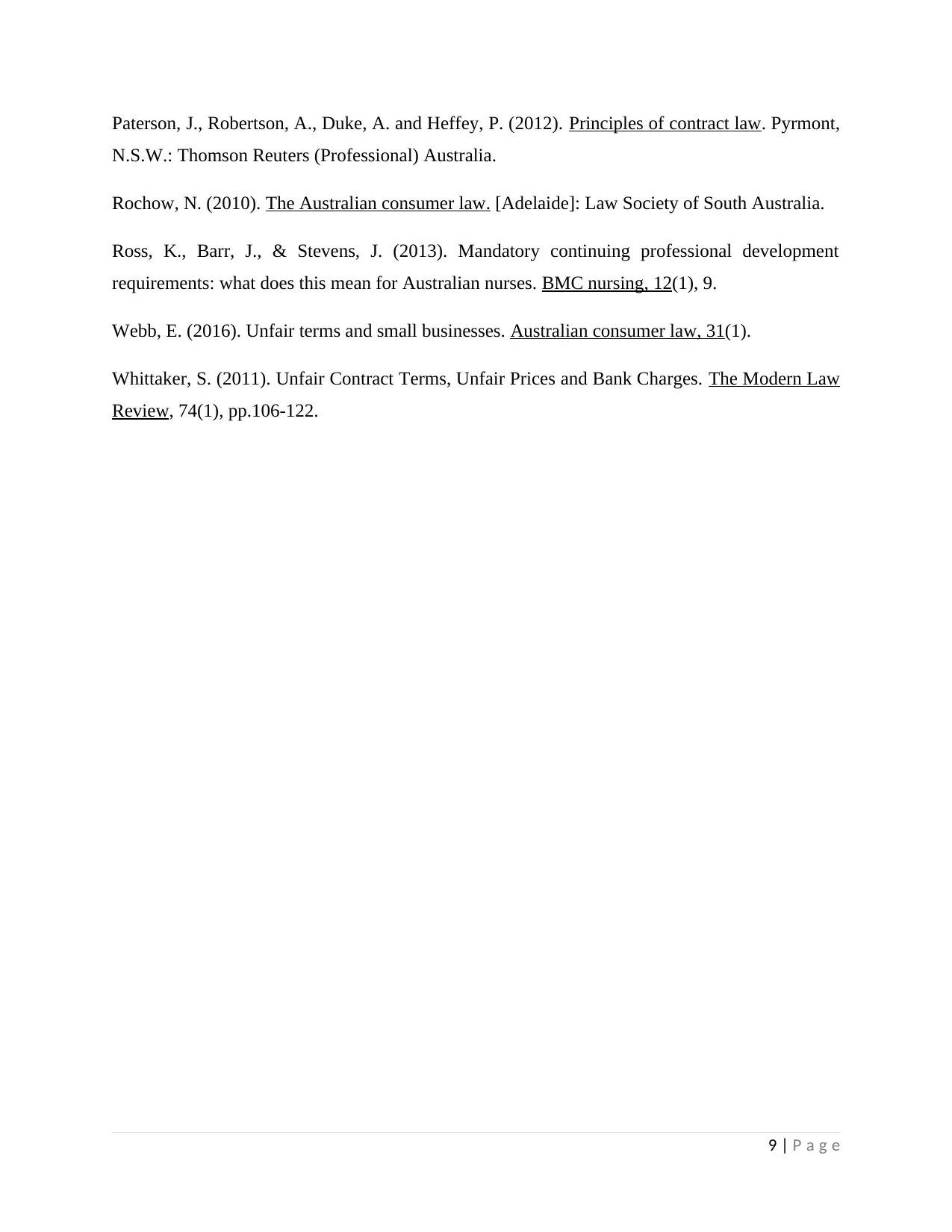
Paterson, J., Robertson, A., Duke, A. and Heffey, P. (2012). Principles of contract law. Pyrmont,
N.S.W.: Thomson Reuters (Professional) Australia.
Rochow, N. (2010). The Australian consumer law. [Adelaide]: Law Society of South Australia.
Ross, K., Barr, J., & Stevens, J. (2013). Mandatory continuing professional development
requirements: what does this mean for Australian nurses. BMC nursing, 12(1), 9.
Webb, E. (2016). Unfair terms and small businesses. Australian consumer law, 31(1).
Whittaker, S. (2011). Unfair Contract Terms, Unfair Prices and Bank Charges. The Modern Law
Review, 74(1), pp.106-122.
9 | P a g e
N.S.W.: Thomson Reuters (Professional) Australia.
Rochow, N. (2010). The Australian consumer law. [Adelaide]: Law Society of South Australia.
Ross, K., Barr, J., & Stevens, J. (2013). Mandatory continuing professional development
requirements: what does this mean for Australian nurses. BMC nursing, 12(1), 9.
Webb, E. (2016). Unfair terms and small businesses. Australian consumer law, 31(1).
Whittaker, S. (2011). Unfair Contract Terms, Unfair Prices and Bank Charges. The Modern Law
Review, 74(1), pp.106-122.
9 | P a g e
1 out of 10
Related Documents
Your All-in-One AI-Powered Toolkit for Academic Success.
+13062052269
info@desklib.com
Available 24*7 on WhatsApp / Email
![[object Object]](/_next/static/media/star-bottom.7253800d.svg)
Unlock your academic potential
Copyright © 2020–2026 A2Z Services. All Rights Reserved. Developed and managed by ZUCOL.





